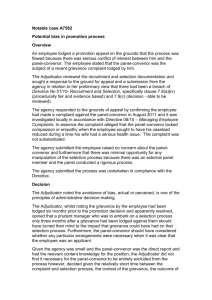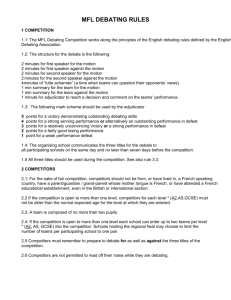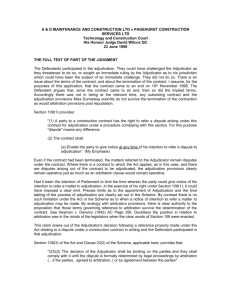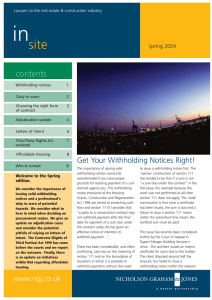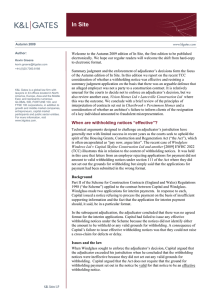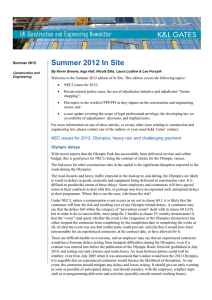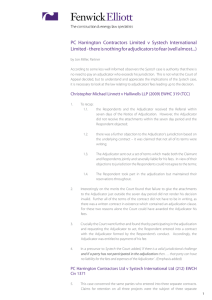pdf - Fenwick Elliott
advertisement
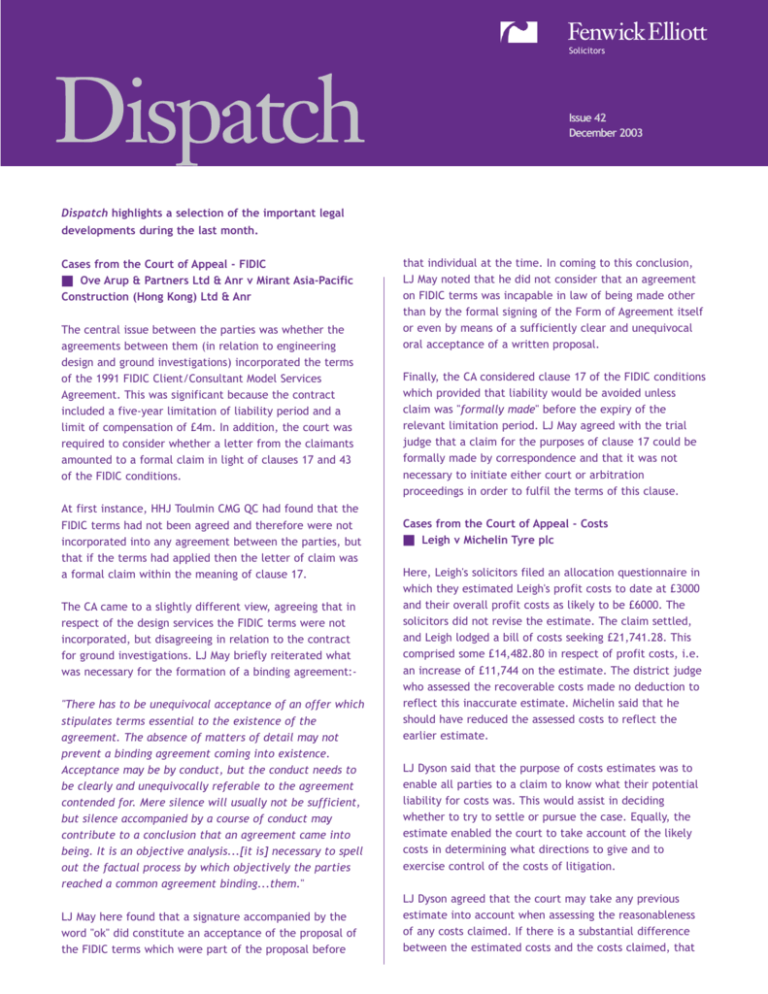
Solicitors Issue 42 December 2003 Dispatch highlights a selection of the important legal developments during the last month. Cases from the Court of Appeal - FIDIC Q Ove Arup & Partners Ltd & Anr v Mirant Asia-Pacific Construction (Hong Kong) Ltd & Anr The central issue between the parties was whether the agreements between them (in relation to engineering design and ground investigations) incorporated the terms of the 1991 FIDIC Client/Consultant Model Services Agreement. This was significant because the contract included a five-year limitation of liability period and a limit of compensation of £4m. In addition, the court was required to consider whether a letter from the claimants amounted to a formal claim in light of clauses 17 and 43 of the FIDIC conditions. At first instance, HHJ Toulmin CMG QC had found that the FIDIC terms had not been agreed and therefore were not incorporated into any agreement between the parties, but that if the terms had applied then the letter of claim was a formal claim within the meaning of clause 17. The CA came to a slightly different view, agreeing that in respect of the design services the FIDIC terms were not incorporated, but disagreeing in relation to the contract for ground investigations. LJ May briefly reiterated what was necessary for the formation of a binding agreement:"There has to be unequivocal acceptance of an offer which stipulates terms essential to the existence of the agreement. The absence of matters of detail may not prevent a binding agreement coming into existence. Acceptance may be by conduct, but the conduct needs to be clearly and unequivocally referable to the agreement contended for. Mere silence will usually not be sufficient, but silence accompanied by a course of conduct may contribute to a conclusion that an agreement came into being. It is an objective analysis...[it is] necessary to spell out the factual process by which objectively the parties reached a common agreement binding...them." LJ May here found that a signature accompanied by the word "ok" did constitute an acceptance of the proposal of the FIDIC terms which were part of the proposal before that individual at the time. In coming to this conclusion, LJ May noted that he did not consider that an agreement on FIDIC terms was incapable in law of being made other than by the formal signing of the Form of Agreement itself or even by means of a sufficiently clear and unequivocal oral acceptance of a written proposal. Finally, the CA considered clause 17 of the FIDIC conditions which provided that liability would be avoided unless claim was "formally made" before the expiry of the relevant limitation period. LJ May agreed with the trial judge that a claim for the purposes of clause 17 could be formally made by correspondence and that it was not necessary to initiate either court or arbitration proceedings in order to fulfil the terms of this clause. Cases from the Court of Appeal - Costs Q Leigh v Michelin Tyre plc Here, Leigh's solicitors filed an allocation questionnaire in which they estimated Leigh's profit costs to date at £3000 and their overall profit costs as likely to be £6000. The solicitors did not revise the estimate. The claim settled, and Leigh lodged a bill of costs seeking £21,741.28. This comprised some £14,482.80 in respect of profit costs, i.e. an increase of £11,744 on the estimate. The district judge who assessed the recoverable costs made no deduction to reflect this inaccurate estimate. Michelin said that he should have reduced the assessed costs to reflect the earlier estimate. LJ Dyson said that the purpose of costs estimates was to enable all parties to a claim to know what their potential liability for costs was. This would assist in deciding whether to try to settle or pursue the case. Equally, the estimate enabled the court to take account of the likely costs in determining what directions to give and to exercise control of the costs of litigation. LJ Dyson agreed that the court may take any previous estimate into account when assessing the reasonableness of any costs claimed. If there is a substantial difference between the estimated costs and the costs claimed, that difference calls for an explanation. If that explanation is unsatisfactory then the court may well conclude that the costs claimed are unreasonable. In addition, specific deductions could be made from the costs recoverable to reflect any impact that inaccurate or uncorrected estimates have had on case management or on the conduct of the other party. Here the CA accepted that the costs estimate was wholly inadequate and that no satisfactory explanation had been provided. However, this in itself was not enough to enable the court to reduce the costs claimed. For such an argument to succeed a party needs to show that it has been prejudiced or acted to its detriment as a result of the inaccurate estimate. Adjudication Q Barnes & Elliot Ltd v Taylor Woodrow Holdings Ltd & Anr and Simons Construction Ltd v Aardvark Developments Ltd There have been two recent cases which deal with what happens when an adjudicator does not issue his decision within the required timescale. In the first, where we acted for the successful party, the adjudication was conducted on a documents-only basis. The adjudicator reached his decision and sent it out in draft form to the parties by email on 20 May 2003. He asked that his draft should be checked to see that all points had been dealt with. Following the making of some changes, the decision was signed on 22 May 2003, the date the decision was due. However, the decision was sent out by dx and only reached the parties on 23 May 2003. The defendants said the decision fell outside the authority given to the adjudicator which was to "make" a decision by 22 May 2003 and that "make" means, under clause 39A.5.3 of the JCT Adjudication Rules, a decision which must reach the parties before the end of 22 May 2003. adjudicator stating that the decision was late and so was not binding. Simons did not pay the fees and in defending the proceedings issued by the adjudicator sought a declaration that the decision was not capable of enforcement. In the Barnes & Elliot case, HHJ LLoyd QC noted that adjudicators ought to be well aware of the importance of complying with the time limits set by Parliament which were, he said, crucial to the effectiveness of adjudication. Given today's instantaneous methods of transmission, the use of first class post or dx was archaic. Thus the contemporaneous duty to communicate a decision could and should easily be achieved by an adjudicator. However, as here, an error by an adjudicator which resulted in a delay of one or two days was excusable and "within the tolerance and commercial practice that one must afford to the Act and to the contract". The decision here was valid and did not become invalid because of an error by the adjudicator in dispatching the decision, which meant that it did arrive within the time limit. However, there are limits to that judicial tolerance and HHJ LLoyd QC suggested that where an adjudicator cannot arrive at a decision within the period required then, before time runs out, further time should if possible be obtained. In the Simons case, HHJ Seymour QC unsurprisingly first of all found that the draft decision was not one which was capable of enforcement by the court. However, he also concluded that the final decision, the one which was seven days late, was binding and capable of enforcement by the court. In other words, the failure here to produce a decision within the required timescale did not deprive the adjudicator of jurisdiction. Dispatch is produced monthly by Fenwick Elliott, the leading construction law firm which specialises in the building, engineering, transport, water and energy sectors. The firm The second case followed the issue of proceedings by an adjudicator for his fees. On the day the decision was due to be published the adjudicator had informed the parties that his mother had died and that although he was in a position to provide a draft decision later that day, he required an extension of time. Aardvark agreed to an extension of time. Simons objected to any decision being published that was not in its final form but made no comment on the request for an extension of time. The adjudicator duly issued his decision marked "draft for the parties' comment" and said that the final decision would be published in seven days. Neither Simons nor Aardvark commented on the draft decision which was duly issued without amendment seven days later. As part of the decision, Simons was ordered to pay the adjudicator's fees. Simons then wrote to the advises domestic and international clients on both contentious and non-contentious legal issues. Dispatch is a newsletter and does not provide legal advice. Solicitors 353 Strand London WC2R 0HT T +44 (0)20 7956 9354 F +44 (0)20 7956 9355 Editor Jeremy Glover jglover@fenwickelliott.co.uk www.fenwickelliott.co.uk

